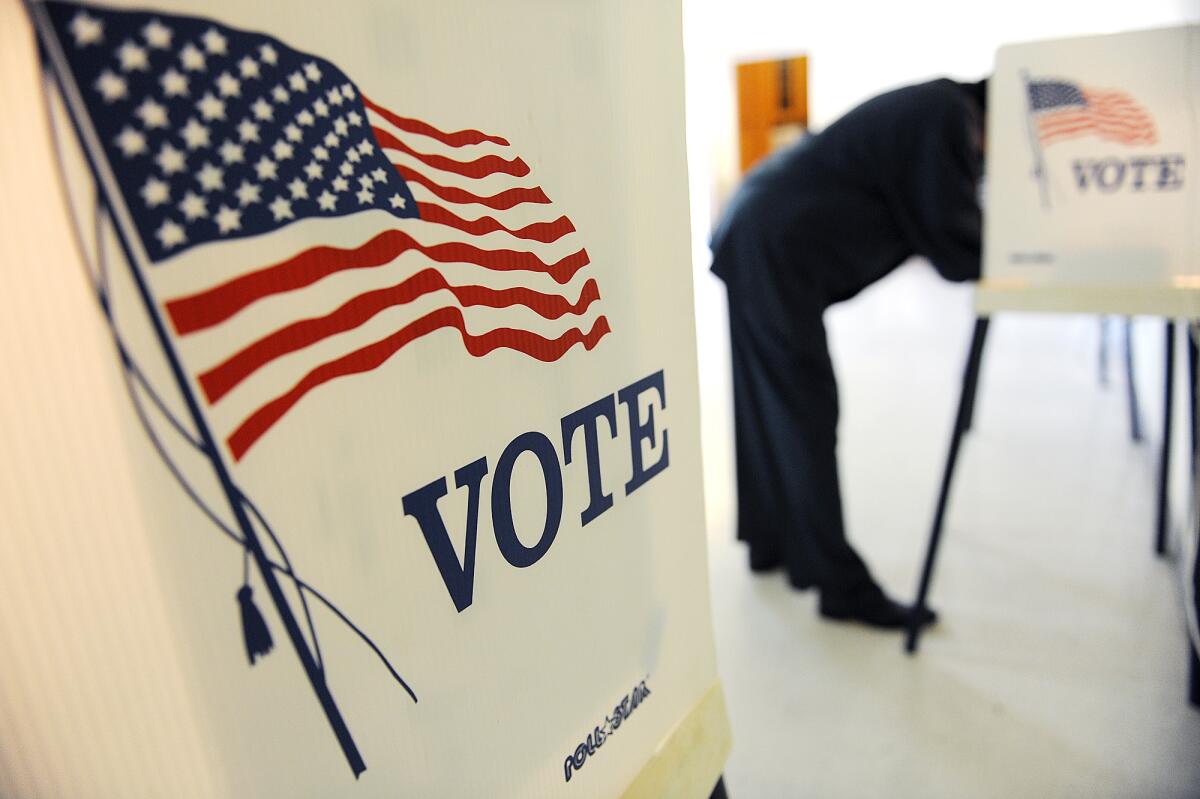Q&A: Here’s how California’s new voter registration law will work

California’s new voter registration law will enable people to register to vote when they go to the DMV to obtain or renew a driver’s license.
California has received a lot of attention in recent days for its new voter registration law, which is intended to streamline the process of signing up to vote and encourage more participation in elections. Here’s what we know — and don’t know yet — about the new law:
What is the process?
When people go to the DMV to obtain or renew a driver's license, or to get a state identification card, they’ll be asked for the usual information in such transactions, such as their name, date of birth and address. They’ll also be asked to affirm their eligibility to vote and will be given the choice of opting out of registering at that time. Information about anyone who does not decline registration will be electronically transmitted from the DMV to the secretary of state’s office, where citizenship will be verified and names will be added to the voter rolls.
SIGN UP for the free Essential Politics newsletter >>
When will this go into effect?
That’s unclear. The law goes into place on Jan. 1, 2016, but the DMV said in a statement that it would not send information to the secretary of state until that office "develops regulations, completes a statewide database system and funding is secured to implement this program.” The regulations, which must be agreed upon between the DMV and the secretary of state, will have to settle basic procedural issues, such as how the “opt-out” question will be phrased and how often the DMV will transmit data.
The statewide voter registration database, Vote-Cal, is on track to be implemented by June 2016, said Secretary of State Alex Padilla. He said he expects funding needs to be minimal, noting that the DMV received money in the current state budget for a technology upgrade. If there are extra costs, he said, “the governor signed the bill, and I interpret his signature as a commitment to funding implementation as necessary.”
Resolving the procedural questions will take some time, Padilla acknowledged. “It won’t be in time for the June primary of 2016,” he said. “At the latest, for the 2018 election cycle, I expect millions of new voters on the rolls in the state of California."
Is this really “automatic” voter registration?
Not quite. No one who is eligible will be registered to vote without their knowledge. Proponents of the New Motor Voter Act have emphasized how the electronic transmittal of information will simplify the process. Lori Shellenberger, voting rights director for the ACLU of California, called the law “a gold standard for what is an automated voter registration, but not automatic.”
How is this law different from Oregon’s, where automatic registration was first enacted?
The key difference is the timing of the “opt-out” choice. In Oregon, there are no questions about voter registration at the point of service at the DMV. Rather, the DMV forwards people's information to the secretary of State. Those deemed eligible receive a card in the mail that informs them of their registered status and allows them to pick a political party or to opt out of registration.
What about people in the country illegally who are able to obtain driver's licenses in California under a law passed in 2013?
Padilla noted that there is already a separate process for residents in the country illegally to apply for special licenses. Although citizens are currently offered the opportunity to register to vote at the DMV under an earlier federal law, noncitizens are not. That will continue under the new registration process. People applying for the special licenses will not be asked about their eligibility to vote and will not be asked if they’d like to opt out of registration.
“We’ve built the protocols and the firewalls to not register people that aren’t eligible,” Padilla said. “We’re going to keep those firewalls in place."
Follow @melmason for more on California government and politics.
MORE POLITICS NEWS:
This is what it's like to run for local office -- from 2,296 miles away
Is Biden running for president? Top aide says vice president is nearing decision
Changing the story: California says convicts with violent felonies have always fought fires
Get the L.A. Times Politics newsletter
Deeply reported insights into legislation, politics and policy from Sacramento, Washington and beyond. In your inbox three times per week.
You may occasionally receive promotional content from the Los Angeles Times.








